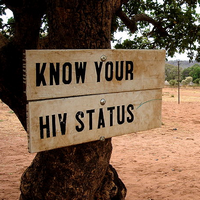In the post-Cold War world, the rapid social, political and economic transformations associated with globalization have coincided with the continuing spread of HIV/AIDS. In fact, it's possible to argue that AIDS is both a product and a cause of globalization, understood here as the whole gamut of economic, social, political and epistemological ways in which more and more of the world is brought within similar systems of governance, consumption and imagination. Up to an estimated 14,000 people a day are infected with HIV, and in most parts of the world, infections are increasing more rapidly than are effective responses. In much of sub-Saharan Africa, the sheer scale of the epidemic is currently threatening continued stability and reversing development.
HIV is striking in the way it links the least developed and the most developed regions of the world. Although its origins are almost certainly in central Africa, AIDS was first identified and named among gay men in coastal cities of the United States. Homosexual transmission remains significant in a number of rich countries and not insignificant in a number of poor ones, despite frequent government denial and obfuscation. Given the routes of transmission, HIV soon spread quickly among injecting drug users, and today needle-sharing is a significant factor in the growth of the epidemic in countries as dissimilar as Vietnam, Argentina and Ukraine.
HIV is linked to globalization in a number of ways, including both its transmission and the development of responses to the epidemic, which have been a major test of the United Nations system, of concepts of international solidarity and civil society, and of the complex set of international agreements and regulations surrounding pharmaceutical patents and manufacture. The United Nations even established a special agency to coordinate its responses to the epidemic. Global mobilization around the demands of a biomedical emergency has inevitably meant the further entrenchment of Western concepts of disease, treatments, sexuality and the body. In some societies, there has been resistance to biomedical conceptions of AIDS, often linked to the interests of traditional healers, but such resistance has been comparatively weak in the face of the homogenizing impact of global biomedical science.

